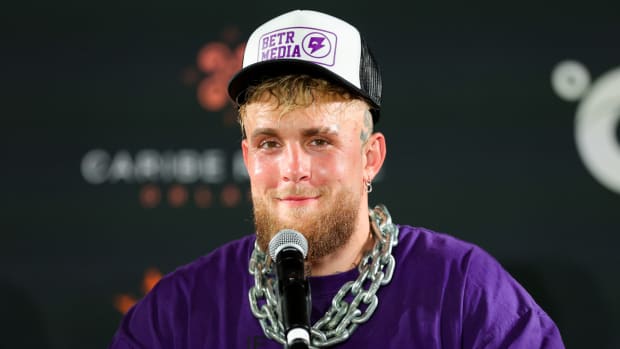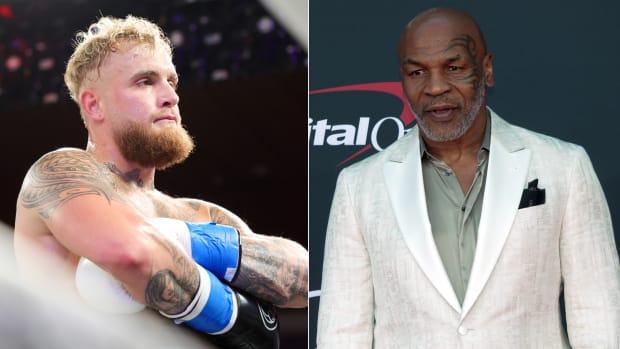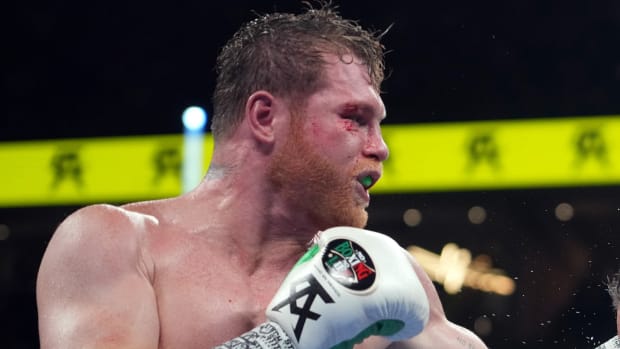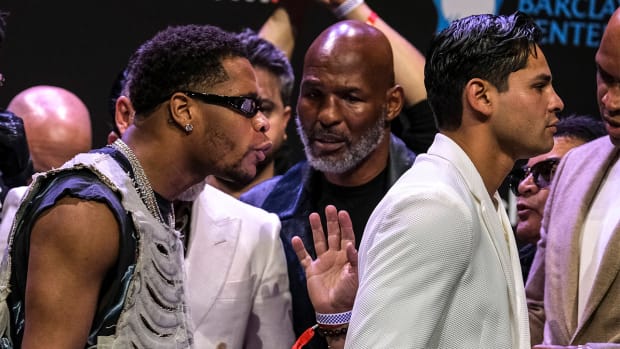From Golden Child to Miracle Man: Daniel Jacobs' journey to Gennady Golovkin face-off
Before the cancer developed, Danny Jacobs was “The Golden Child,” a 24-year-old star-to-be in the world of boxing. Then came the diagnosis: osteosarcoma. Malignant, doctors determined. Aggressive. Jacobs was in for the fight of his life, so to speak—up against his toughest opponent.
But those metaphors rang hollow for his longtime girlfriend, Natalie Stevens, on that Spring Saturday in 2011, when doctors rushed Jacobs to the operating room. As they attempted to remove a rapidly growing tumor from his spine, she sat in the windowless waiting area. Other families came and went. The staff packed up. The TVs turned off automatically.
During Jacobs' fights, Stevens unleashes a particular scream, one she knows her boyfriend will recognize. But as the hours passed this time, she could only sit silently in a sterile wooden chair, fearing the worst, or wondering if the best could even be that good. Eventually she heard the surgeon's footsteps echoing through the hall, carrying news from the OR.
That doctor, Weill-Cornell Medicine/New York-Presbyterian Hospital neurosurgeon Roger Hartl, generally avoids the language of battle with his patients. It's over-dramatic, he feels, and implies that certain outcomes are equivalent to defeat and thus failure. The fight metaphor dates back to ancient times, when every difficult challenge was framed as armed conflict, and it persists in modernity to drum up public support, a la The War on Cancer (there’s also a cynical view that private healthcare systems embrace the metaphor because refusing to succumb coincides with continuing to pay). No one has embodied the viewpoint quite like Lance Armstrong, who famously said that patients had two options, "Give up, or fight like hell." His battle inspired millions, giving sufferers a renewed sense of meaning, but it alienated others.
“To speak of lost battles as though the warrior didn’t want victory badly enough projects our proclivity to control outcomes onto something that cannot be controlled,” argues Heather Cleland, who dealt with Hodgkin’s lymphoma herself. A growing body of literature suggests caregivers should at least be conscious of what metaphors they use and how they frame patient understanding. The most common alternative, for Hartl and others, is the presentation of a journey: exploration, bumps in the road, moving forward, etc. (similar to the prevailing description of addiction recovery).
But with Jacobs, Hartl was comfortable describing the situation as a fight. That’s the language Jacobs knew best, after all, and given that he has won 32 of his 33 pro matches, it provided an encouraging framework.
Fight No. 34 comes Saturday, a face-off with Gennady Golovkin at Madison Square Garden for the middleweight world title, and with it, a return of the cancer-as-fight trope. As Jacobs’ trainer, Andre Rozier, said in a pre-fight interview, “His hardest battle has been won and he faced it like a true warrior.” Experts looking to pick the heavy underdog have used the same comparison to say, What’s an undefeated Kazakh knockout-artist to a guy who fought off death itself? Jacobs makes the allusion, too, dismissing Golovkin with three words.
“He’s not cancer.”
Stevens breathed a sigh of relief. The surgery had gone well, Hartl told her. When she walked in to see Jacobs, he was puffier than any opponent had ever left him, his eyes rolling around in search of hers. When they finally connected, tears flowed.
After graduating from intensive care to a standard hospital bed, Jacobs was wheeled into a conference room already full of doctors. He still remembers the formal language. Due to the severity of the surgery… As far as your boxing career… We recommend…
Basically, they told him, he was done boxing forever. “It was like, Booooooom. Everything just dropped inside of me,” Jacob says. “It was like the love of your life just calls you and breaks up with you. It's that emptiness.” Social workers introduced themselves and asked if he was having suicidal thoughts.
Jacobs had first picked up gloves to escape Brownsville, a Brooklyn neighborhood that includes the most dangerous police precinct in New York, a collection of public housing units nicknamed "Baby Iraq," and all of the issues that come with cycles of poverty and addiction. That, and he wanted to fight the eighth grade bully. Not long after sparring the kid out of the gym, Jacobs won a national tournament in Kansas City. He'd never been on a plane before, and the opportunity to travel invigorated him. He added a string of amateur titles and ended up a couple victories short of making the 2008 Olympic team before turning pro. He figured his Olympic trials defeat would dampen interest, but seemingly everybody still reached out to represent him, and he ended up signing with Al Haymon, Floyd Mayweather’s manager.
That's when his career—and life—took off. He officially went pro with a December 2007 fight at the MGM Grand on the undercard of a Mayweather match. He fought—and won—12 matches over the next 12 months, 11 by knockout. He moved out of Brownsville like he always dreamed, using his signing bonus to nab an apartment at the Avalon Riverview in Long Island City. It was the coolest place he could imagine. “That was the biggest accomplishment,” he says. “I remember looking into the city thinking, ‘I can't believe this is my life.’” He upgraded to a Park Slope penthouse when Stevens got pregnant with their first child. He jet-setted to Las Vegas, California, and Chicago and soaked in the adulation he had earned. He was ESPN's 2009 Prospect of the Year, and, in 2010, he got his first world title shot, against Russian Dmitry Pirog. But as was the case with the Olympic trials, Jacobs missed out on a potential mainstream breakthrough, this time suffering his first pro defeat. And alongside it came the death of his grandmother, who had gone by Lady Bird, to lung cancer.
Now, cancer was taking even more. After losing his livelihood, Jacobs’ inability to bathe himself sapped his pride. And the financial cost of it all gobbled up his worldly possessions, starting with the brand new Camaro SS he had recently purchased. Even with Stevens going to work as a makeup artist, there was never enough money.
When their lease came up for renewal on the Park Slope penthouse, Jacobs moved back in with his mom on Pitkin Ave., bringing his son, Nathaniel, to a neighborhood he thought he'd left in the past. He slept on the couch and on an air mattress. Just as often, he lied awake, listening to loud music and gunshots, thinking about the time police rushed the house at 3 a.m. looking for his brother. “Moving back in with my mom was the hardest part,” Jacobs says. “Going back to where I had wanted to escape, you feel like you can't provide for your family.” He hardly ever left the house. After enjoying the love from locals as a rising boxer, he now hated being seen.
But, as the story goes, Jacobs never fully gave in. “Some part of me could not accept it,” he says, “I understood and respected the doctors, but some part of me always knew I was going to come back. I think that’s where the fight began.”
The first steps in that return bid turned out to be the most difficult. Literally. Following surgery, Jacobs went days without feeling in his legs. He worried that he’d never walk again, or even get to bounce his then-two-year-old son on his knee. With nothing else to do, he would roll himself to his hospital room window, where he’d watch people go about their days at the bus stop five stories below. Jacobs considered the brief connection with the outside world his “only joy,” but Stevens could tell those glimpses were actually just making her boyfriend more depressed. Otherwise, his days were marked by grueling therapy sessions, at home and in the hospital—laying flat and trying to lift a leg in the air, or sitting in a chair and attempting to raise a knee. Eventually, he built up the stamina to stand, with the aid of a nurse or a walker at least. Then, he relearned how to walk. He took a step all by himself before grabbing for support. A day later it was two. Within a week he could manage 10 short paces. “When I tell you the sense of accomplishment I felt,” Jacobs says, “It was a joyous moment. I was a kid again.”
As soon as he could, Jacobs returned to the gym. The first time, he lumbered in with a back brace, threw six punches—each with a grunt—and then declared, Alright, that’s enough for today. Weeks of gradual improvement passed. The time moved slowly in Jacobs’ mind, but doctors thought he was pushing himself way too much way too fast. So did Stevens. Soon, he was sparring again, first against a guy he had 40 pounds on but who still managed to shake him with a hook. After that punch, Jacobs asked himself, Do I really want this? He was back in the gym the next day.
If he needed more motivation, he got it when Brooklyn’s Barclays Center announced that it would be hosting its first boxing matches in October 2012. Two years earlier, before the loss to Pirog and the cancer, Jacobs was hailed as a centerpiece of a deal for his promoters to put on big-ticket fights there. Now, he set his sights on having it play host to his comeback. Just 18 months after his diagnosis, he sat behind the podium at the Marriott New York at Brooklyn Bridge for the pre-fight press conference, overcome by what he was seeing. “He invited me to the fight and I said, ‘No way,’” Hartl says. “I wanted to ignore it because I was really worried.”
Jacobs beat Josh Luteran by technical knockout on Oct. 20, 2012, the first of 10 straight post-cancer victories that bounced him back to the top of the middleweight ladder (Hartl has been to several, though each is still nerve wracking). “I’ve achieved all my dreams,” Jacobs says, like buying a home for his family (they’re currently deciding between Georgia and Florida), and seeing his face on a billboard in Times Square, where it was plastered before a 2013 fight against Giovanni Lorenzo. Today, the cancer’s only lasting effect is a bit of numbness in Jacobs’ left pinky toe when lies down at night and a vertical scar on his back that hides a rod and some screws. Everything he lost to the disease, he says he's gotten back. And he's not done fighting.
That’s the narrative, anyway. But what of everything it leaves out?
Consider how Jacobs got to the hospital in the first place.
A few months after his loss to Pirog, Jacobs had originally figured that the tingling in his feet was the result of not working out enough. When it lingered, he considered the possibility of sciatica. Eventually, he swallowed his pride and went to a doctor, who told him he had a pinched nerve. But his condition kept deteriorating. Over the course of two weeks, he went from needing a cane to using crutches to pulling out his late grandmother's walker, tennis balls and all. Finally, he decided he’d enjoy a couple more days before returning to the hospital and getting the issue solved. He woke up the next morning unable to get out of bed. His cell phone was stuck in his car outside—he'd left it there the night before and had felt too weak to get it. “I had no communication with the world,” he says, “Just me in my bed, literally dying.”
“Miraculously, I heard this knock at the door.” It was Jacobs’ godmother, Dorothea Perry, who grew worried when Jacobs failed to answer his phone and who had somehow convinced the guard in the lobby to let her upstairs. “I call her my angel,” Jacobs says. He slithered out of bed and through the living room, crawling on the hardwood all the way to the door and using the wall to support himself long enough to open it. The two immediately went to the hospital, Jacobs still wearing the white t-shirt and jeans he was unable to get off the previous night. The first neurologist he saw told Jacobs she’d seen the condition before. “The person she had seen it from actually didn't make it,” he says. Another doctor told him that if he'd waited another two days to come in, as he had originally planned, it likely would have been too late.
Other outside interventions propelled him along the way. There was the intraoperative CT scanner and image-guided surgical navigation system that Hartl used for a less invasive surgery and the targeted IMRT radiation therapy Dr. Janna Andrews employed afterwards. She also relied on some strong language to wrangle Jacobs in for his appointments that he so often seemed willing to skip—a sign to Andrews that the star athlete maybe wasn’t taking his predicament as seriously as he ought to. Jacobs admits that he was scared to go to his supposedly twice-annual checkups. The first time it took him nine months to go in and see if the cancer had returned (it hadn’t). Even when he was motivated, he relied on friends to drive him out to Long Island and back.
Focusing on Jacobs’ achievement also ignores his darker stretches when reality overpowered will. There were the hours after surgery when he begged for pain meds between 45-minute doses. Then came days spent wondering why this had happened to him, just when he had achieved his dream. Those were followed by weeks sitting at home, playing video games or watching TV, ignoring Stevens’ demands that Jacobs do something—anything. In general, Jacobs says, his girlfriend “got the short end of the stick. She would tell you, I felt so bad back then and there was no one else I could take the frustration out with. That’s why she was such a strong woman, understanding that it was bigger than me yelling or me feeling some type of way at that particular moment. She just kept encouraging me saying, ‘It’s going to be OK. You’re going to get there.’”
The lighter moments get left out of the traditional narrative, too, like Jacobs laughing with Andrews about how fat he was starting to look (Still, Andrews remembers her mainly female staff looking forward to his visits). To this day, Stevens chuckles about the arrangements she and Jacobs made each time he had to relieve himself, her scrambling for some sort of container to hand him and then finding somewhere to dispose of it. Jacobs also got to spend more time with his son than he did during the constant blur of fighting and training, while finding a newfound appreciation for those moments.
Then there is everything Jacobs has achieved since his final radiation treatment, all of which goes ignored when his heroics are defined by the eradication of his cancer. Now 30, Jacobs is no longer “The Golden Child.” He goes by “The Miracle Man” and has a ribbon tattooed on his chest to remind him of everybody he fights for.
Though he knew the fight metaphor falls short in many areas, Dr. Hartl did learn one way in which it’s instructive. “The loneliness that somebody with cancer deals with reminds me of what somebody who does Danny's job probably feels,” Hartl says. “If you have cancer there is no real team there, just like those moments before you step into the ring. I'm sure you must be scared and frightened to a certain extent because you could really, really get hurt. It comes down to the personal risks you take and the consequences only you may face.”
Jacobs made the same connection, and since recovering, he’s regularly visited pediatric cancer wards, either by himself or as part of his nascent Get In The Ring Foundation, trying to spread the love he felt when he was recovering. His favorite event is the superhero party, when ill children dress up and forget about their daily struggles. The best part, he says, is when he pulls out a boxing championship belt and puts it on kids’ shoulders. They light up every single time.
When people ask Jacobs why he keeps going, given everything he has overcome and achieved, he knows his answer sounds cheesy. But he swears it's true. “Giving back—that's the purest joy you can possibly have.” And he knows what a win Saturday would mean for his ability to help others. When it came time to stand face-to-face with Golovkin at a pre-fight press event, “I was just so ready,” Jacobs says. “I’m not worried about anything.”
Later that day, he hung out in his hotel room, feet up on the ottoman, before heading to Brooklyn to meet Rozier in their cellar-gym for a two-hour session at 8:30 p.m. In the stairwell leading from an unmarked door on the street down to their fight cave, there’s a photo of Jacobs from when he took that trip to Kansas City and launched his career. Inside, the room is crowded with punching bags and a square ring. The bathroom doubles as a storage closet. Midway through the workout, Rozier has to climb back up to tell the cook in the ground-floor market above them to stop smoking because his fumes are starting to fill the air below ground. The only sound in the place comes from a TV in the corner, showing Golovkin’s most recent fights, a string of knockouts. Between drills, Jacobs watches, unfazed.
As part of his match preparation, Jacobs attended a series of meditation sessions in which he visualized victory. The images eventually began to feel so lifelike that he started weeping, imagining what a win might mean. “I really feel like this is my opportunity,” he says, “This is my moment. If you’re big on being spiritual or on the man up above, I really feel like he wouldn’t let me get this far to allow me to fail myself at this point.”
Then again, Jacobs says, “I’m super proud of myself, not because I can throw punches inside a ring but just because of my journey and who I proved that I am.” The fight—metaphorical or literal—it turns out, is not everything.








